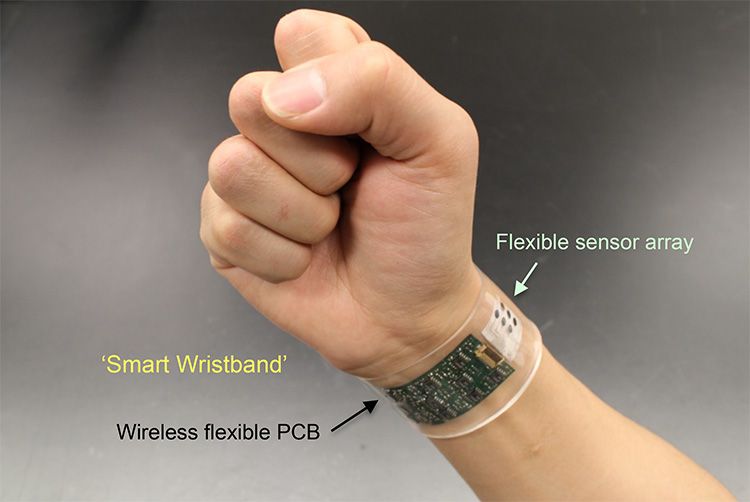
If the thought of having your blood taken makes you sweat, take heart.
Researchers have developed a sensor that measures health signs from sweat alone. Worn as a wristband or headband, the device measures body temperature and tracks dehydration and fatigue by monitoring the electrolytes sodium and potassium and the metabolites lactate and glucose. A smartphone app collects the data wirelessly.
"Sweat is very complex, it contains tens to hundreds of compounds and it changes depending on the person's state and health condition," says UC Berkeley professor of electrical engineering and computer science Ali Javey, who leads the team that built the device. "We knew sweat was rich with info about the physiological state of the body. The question was, could we build a wearable system to analyze it and get that information?" The researchers described the device they came up with in an article in Nature this week.
UC Berkeley professor George Brooks, an exercise physiologist and a co-author of the paper, helped test the device, strapping it to volunteers while they rode on stationary bicycles or ran. "When professor Javey came to us with the technology we were really moved to think of the things you could do with it now and in the future," says Brooks.
The tool's potential applications go beyond tracking athletic performance and making physiology studies less of a pain for researchers and participants. Javey is now working on expanding the library of chemicals the sensor measures and hopes to eventually have a device that lets everyday people passively monitor all sorts of health markers such as stress, medication level and exposure to heavy metals. "You have to look at a spectrum of chemicals and then, following the trend, you can get an accurate picture of the health of the individual," says Javey. "The goal was to use a body fluid that could be tested noninvasively, without poking the patient."
That doesn't mean he wants nurses to lay down their needles. The lab's plan is to complement established health screenings such as the blood test, which he calls the gold standard. The monitor would alert wearers to act to stay healthy—by popping a missed pill, responding to dropping sugar levels or, if necessary, calling a doctor.
For Brooks, the sweatband is one of many sensor-based advances that could be on the horizon. "These important metabolites can be measured in any fluid," he says. "This technology could be adapted to measure these things in blood in an ambulance, emergency room or hospital. It's not just sweat—this is a harbinger of great things to come."
Uncommon Knowledge
Newsweek is committed to challenging conventional wisdom and finding connections in the search for common ground.
Newsweek is committed to challenging conventional wisdom and finding connections in the search for common ground.
About the writer
To read how Newsweek uses AI as a newsroom tool, Click here.








